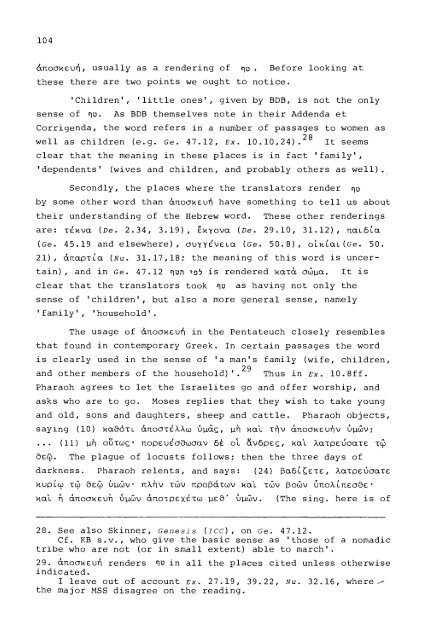A Lexical Study of the Septuagint Version of the Pentateuch
A Lexical Study of the Septuagint Version of the Pentateuch
A Lexical Study of the Septuagint Version of the Pentateuch
You also want an ePaper? Increase the reach of your titles
YUMPU automatically turns print PDFs into web optimized ePapers that Google loves.
αποσκευή/ usually as a rendering <strong>of</strong> qu . Before looking at<br />
<strong>the</strong>se <strong>the</strong>re are two points we ought to notice.<br />
'Children', 'little ones', given by BDB, is not <strong>the</strong> only<br />
sense <strong>of</strong> qo. As BDB <strong>the</strong>mselves note in <strong>the</strong>ir Addenda et<br />
Corrigenda, <strong>the</strong> word refers in a number <strong>of</strong> passages to women as<br />
1R<br />
well as children (e.g. Ge. 47.12, Ex. 10.10,24). It seems<br />
clear that <strong>the</strong> meaning in <strong>the</strong>se places is in fact 'family',<br />
'dependents' (wives and children, and probably o<strong>the</strong>rs as well).<br />
Secondly, <strong>the</strong> places where <strong>the</strong> translators render qu<br />
by some o<strong>the</strong>r word than αποσκευή have something to tell us about<br />
<strong>the</strong>ir understanding <strong>of</strong> <strong>the</strong> Hebrew word. These o<strong>the</strong>r renderings<br />
are: τέκνα (De. 2.34, 3.19), εκγονα (De. 29.10, 31.12), παιδία<br />
(Ge. 45.19 and elsewhere), συγγένεια (Ge. 50.8), οίκίαι(σβ. 50.<br />
21), απαρτία (NU. 31.17,18; <strong>the</strong> meaning <strong>of</strong> this word is uncer<br />
tain) , and in Ge. 47.12 qun 'at? is rendered κατά σώμα. It is<br />
clear that <strong>the</strong> translators took qu as having not only <strong>the</strong><br />
sense <strong>of</strong> 'children', but also a more general sense, namely<br />
'family', 'household'.<br />
The usage <strong>of</strong> αποσκευή in <strong>the</strong> <strong>Pentateuch</strong> closely resembles<br />
that found in contemporary Greek. In certain passages <strong>the</strong> word<br />
is clearly used in <strong>the</strong> sense <strong>of</strong> 'a man's family (wife, children,<br />
29<br />
and o<strong>the</strong>r members <strong>of</strong> <strong>the</strong> household)'. Thus in Ex. 10.8ff.<br />
Pharaoh agrees to let <strong>the</strong> Israelites go and <strong>of</strong>fer worship, and<br />
asks who are to go. Moses replies that <strong>the</strong>y wish to take young<br />
and old, sons and daughters, sheep and cattle. Pharaoh objects,<br />
saying (10) καθότι αποστέλλω υμάς, μή και τήν άποσκευήν υμών;<br />
... (11) μή ούτως· πορευέσθωσαν δέ οί άνδρες, και λατρεύσατε τω<br />
θεω. The plague <strong>of</strong> locusts follows; <strong>the</strong>n <strong>the</strong> three days <strong>of</strong><br />
darkness. Pharaoh relents, and says: (24) Βαδίζετε, λατρεύσατε<br />
κυρίω τω θεω υμών πλήν τών προβάτων και τών βοών ύπολίπεσθε·<br />
καΙ ή αποσκευή υμών άποτρεχέτω μεθ' υμών. (The sing, here is <strong>of</strong><br />
28. See also Skinner, Genesis (ICC), on Ge. AT.12.<br />
Cf. KB s.v., who give <strong>the</strong> basic sense as 'those <strong>of</strong> a nomadic<br />
tribe who are not (or in small extent) able to march'.<br />
29. αποσκευή renders W in all <strong>the</strong> places cited unless o<strong>the</strong>rwise<br />
indicated.<br />
I leave out <strong>of</strong> account Ex. 27.19, 39.22, Nu. 32.16, where ^<br />
<strong>the</strong> major MSS disagree on <strong>the</strong> reading.

















